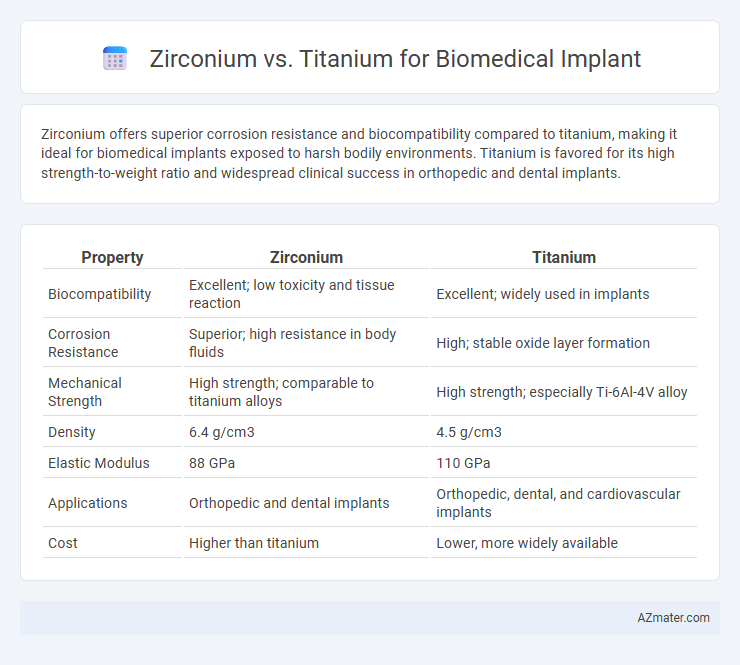Zirconium offers superior corrosion resistance and biocompatibility compared to titanium, making it ideal for biomedical implants exposed to harsh bodily environments. Titanium is favored for its high strength-to-weight ratio and widespread clinical success in orthopedic and dental implants.
Table of Comparison
| Property | Zirconium | Titanium |
|---|---|---|
| Biocompatibility | Excellent; low toxicity and tissue reaction | Excellent; widely used in implants |
| Corrosion Resistance | Superior; high resistance in body fluids | High; stable oxide layer formation |
| Mechanical Strength | High strength; comparable to titanium alloys | High strength; especially Ti-6Al-4V alloy |
| Density | 6.4 g/cm3 | 4.5 g/cm3 |
| Elastic Modulus | 88 GPa | 110 GPa |
| Applications | Orthopedic and dental implants | Orthopedic, dental, and cardiovascular implants |
| Cost | Higher than titanium | Lower, more widely available |
Introduction to Biomedical Implant Materials
Zirconium and titanium are widely used materials in biomedical implants due to their excellent biocompatibility, corrosion resistance, and mechanical properties. Titanium offers a high strength-to-weight ratio and osseointegration capability, making it a standard in orthopedic and dental implants. Zirconium, often utilized in its alloy or ceramic form, provides enhanced wear resistance and reduced ion release, making it an increasingly popular choice for long-term implant stability and patient safety.
Overview of Zirconium and Titanium
Zirconium and titanium are widely used materials in biomedical implants due to their exceptional biocompatibility and corrosion resistance. Titanium, known for its high strength-to-weight ratio and excellent osseointegration properties, is the standard choice in dental and orthopedic implants. Zirconium, featuring a lower modulus of elasticity closer to natural bone and superior wear resistance, offers promising advantages for load-bearing implants and enhanced longevity.
Mechanical Properties: Strength and Durability
Zirconium exhibits high strength and exceptional corrosion resistance, making it highly durable for biomedical implants subjected to aggressive bodily environments. Titanium offers a superior strength-to-weight ratio with excellent fatigue resistance and biocompatibility, often favored in load-bearing orthopedic applications. Both metals demonstrate outstanding mechanical properties, but titanium's versatility in various implant designs often gives it an edge in long-term durability and implant longevity.
Biocompatibility and Tissue Response
Zirconium and titanium are prominent materials in biomedical implants due to their exceptional biocompatibility, with titanium widely recognized for forming a stable oxide layer that promotes osseointegration and minimizes immune reactions. Zirconium exhibits excellent corrosion resistance and bioinertness, often resulting in favorable tissue response and reduced inflammation compared to titanium, especially in patients with metal sensitivities. Both metals demonstrate robust mechanical properties, but zirconium's enhanced surface chemistry can lead to improved soft tissue integration and long-term implant success in orthopedic and dental applications.
Corrosion Resistance in Biological Environments
Zirconium exhibits superior corrosion resistance compared to titanium in biological environments due to its stable oxide layer that resists degradation and ion release. Titanium forms a protective titanium dioxide layer, yet this can be compromised under certain body fluids, leading to potential inflammation. Zirconium's enhanced biocompatibility and corrosion resistance minimize metal ion leaching, making it highly suitable for long-term biomedical implants.
Osseointegration: Bone Bonding Capabilities
Zirconium exhibits superior osseointegration properties compared to titanium due to its bio-inert surface and enhanced corrosion resistance, facilitating stronger bone bonding and reduced risk of implant failure. Titanium, while widely used for its mechanical strength and biocompatibility, may develop a less stable oxide layer, impacting long-term bone integration. Clinical studies indicate zirconium implants promote faster and more robust bone apposition, making them highly effective for orthopedic and dental applications requiring durable bone-implant interfaces.
Wear Resistance and Longevity
Zirconium exhibits superior wear resistance compared to titanium, making it ideal for biomedical implants subjected to high friction and mechanical stress. The enhanced hardness and corrosion resistance of zirconium alloys contribute to extended implant longevity by minimizing surface degradation and metal ion release. Titanium, while biocompatible and widely used, may experience higher wear rates in dynamic environments, potentially reducing implant lifespan relative to zirconium-based materials.
Allergic Reactions and Hypersensitivity Risks
Zirconium exhibits lower allergic reactions and hypersensitivity risks compared to titanium, making it a preferable choice for patients with metal sensitivities. Titanium, while highly biocompatible and widely used, can induce hypersensitivity responses in a small subset of individuals due to ion release and corrosion. Advanced surface treatments on zirconium implants further minimize immune activation, enhancing their suitability for sensitive biomedical applications.
Clinical Applications and Case Studies
Zirconium and titanium are widely used materials for biomedical implants due to their excellent biocompatibility, corrosion resistance, and mechanical properties. Clinical applications reveal titanium's superiority in orthopedic implants like hip and knee replacements, attributed to its osseointegration and strength, while zirconium demonstrates promising results in dental implants and femoral components, benefiting from reduced allergic reactions and enhanced wear resistance. Case studies highlight titanium implants' long-term success rates above 90%, whereas zirconium implants show comparable biocompatibility with fewer inflammatory responses, making both materials viable options depending on patient-specific needs and implant location.
Future Trends in Biomedical Implant Materials
Zirconium and titanium are pivotal materials in the future of biomedical implants due to their superior biocompatibility, corrosion resistance, and mechanical strength. Innovations focus on surface modifications like nano-texturing and bioactive coatings to enhance osseointegration and reduce infection risks. Emerging trends also include the development of zirconium-titanium alloy composites that combine the advantageous properties of both metals for improved implant longevity and patient outcomes.

Infographic: Zirconium vs Titanium for Biomedical implant
 azmater.com
azmater.com